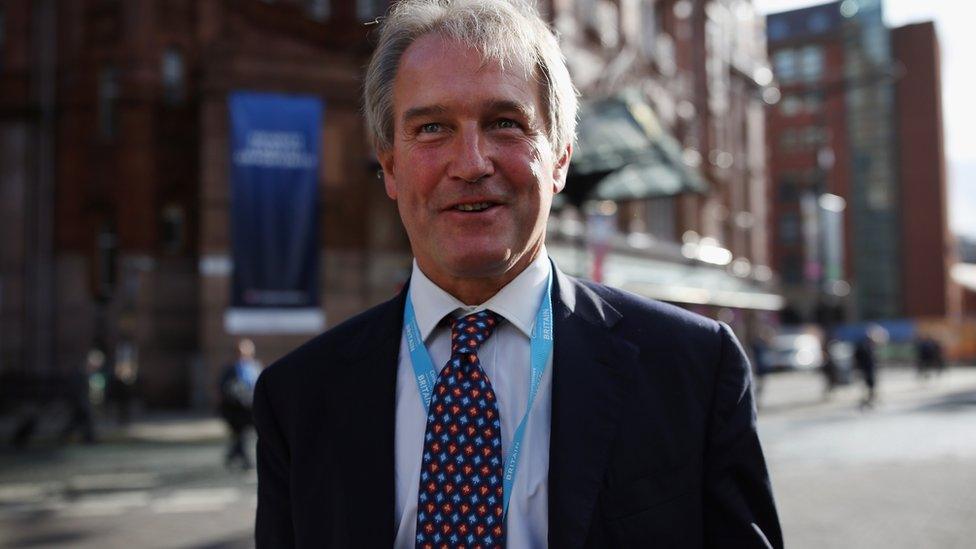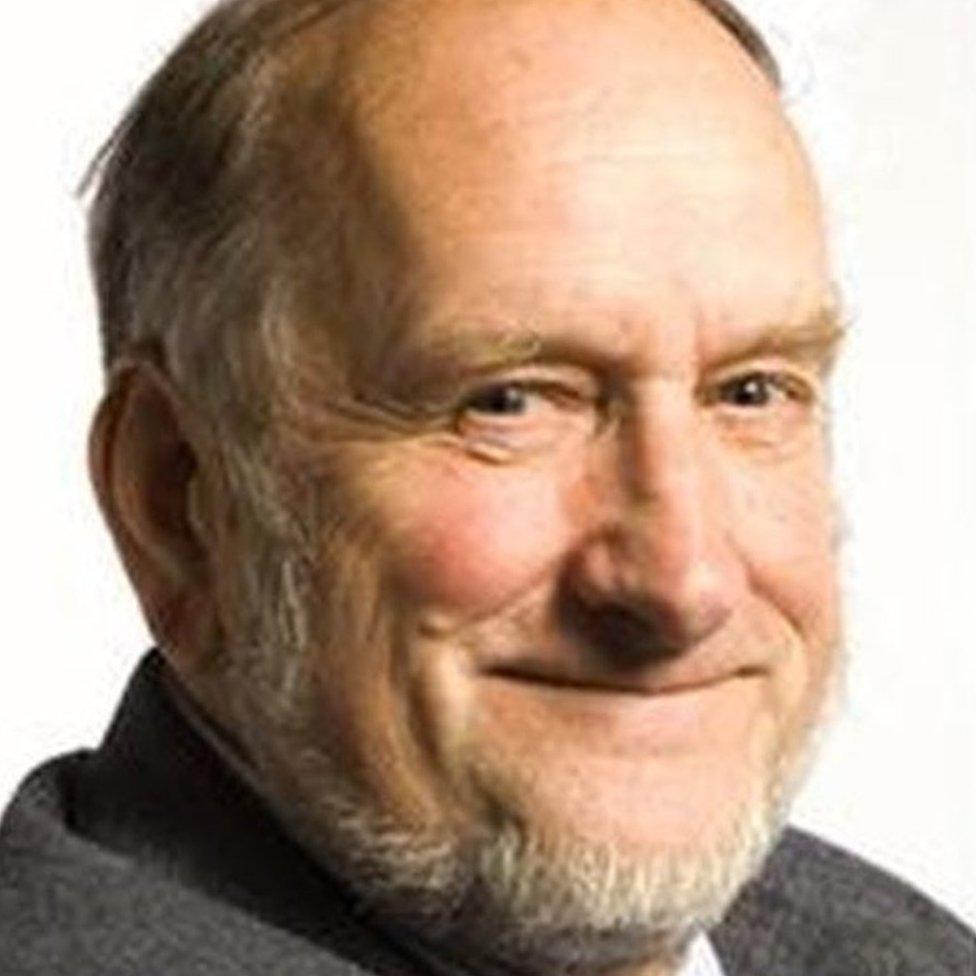Politics of marriage proposals and divorce petitions
- Published

Divorce talk seems to be catching
So Theresa May now has Parliament's permission to initiate the divorce proceedings that will end end Britain's 44-year marriage to what is now known as the European Union: a 'union" in name only, perhaps, given its fractured politics even before the Brexit vote.
A similar charge could be levelled at the so-called United Kingdom, now that Nicola Sturgeon is also petitioning for divorce.
In her case it would mean the break-up of that far longer-established union, the 400 year-old bond between Scotland and the UK.
So this makes it an intriguing moment for one of our senior Conservative MPs to make a move in the opposite direction, to propose not a divorce, but a marriage.
The former Cabinet minister and North Shropshire MP Owen Paterson is calling for two of his neighbouring councils, Shropshire and Telford and Wrekin, to tie the knot.
Attraction of opposites
On the face of it the two areas have precious little in common.
Telford and Wrekin, population 167,000, is concentrated tightly around the new town itself.
It has a Labour council and tends to look east, economically and socially, towards the industrial West Midlands.
The i54 Business Park, including Jaguar Land Rover's engine plant, is less than 10 minutes away along the motorway, on the northern outskirts of Wolverhampton.
Telford and Wrekin is surrounded by Shropshire, population 306,000.

Could largely rural Shropshire link up with Telford & Wrekin?
Its Conservative-controlled council covers a diffuse, predominantly rural community, which has a strong affinity with Wales to the west: not for nothing is the main bridge across the River Severn in the county town of Shrewsbury known as the Welsh Bridge.
They do, however, have one important thing in common. And that takes us back, paradoxically, to Scotland.
In common with all the local authorities north of the border, Shropshire and Telford and Wrekin are both all-purpose unitary councils.
Nineteen years ago, Telford and Wrekin became independent from Shropshire, like an autonomous island surrounded by the county.
Its council took responsibility for the full set of local services.
This in turn left Shropshire County Council, like other 'shire' authorities, with its long-established two-tier system: at the top, the county council, and underneath it, five district authorities.

Owen Paterson has written to Communities Secretary Sajid Javid proposing the merger of the councils
As a general rule of thumb, the districts were responsible for the more personal local services while the county had a broader strategic remit.
One example: the districts collected residents' rubbish from their dustbins and the county disposed of it.
But in 2009, Shropshire, too, joined the unitary club. It was a victory for the argument that single-tier local government could achieve economies of scale and cut out wasteful duplications.
It was also generally considered easier for local voters to understand exactly who should be held accountable for what.
Here comes another irony which takes us back, yet again, to Scotland.
It's hard to believe now in this era of SNP government in a Scottish parliament, but in the final years before the "devolved nations", John Major's Conservative government was able, without significant resistance, to introduce its preferred unitary system of local government in Scotland and Wales.

The first West Midlands Mayoral election will take place in May
Whereas vast swathes of England, outside the "metropolitan" conurbations, signalled so much hostility to the very idea that in the Tory heartlands, it was kicked into the proverbial long grass: ministers nursed the private hope that local leaders would eventually see for themselves the benefits of unitary status.
That's certainly what happened in Shropshire. Herefordshire became a unitary in 1998, as part of its divorce settlement from a distinctly rocky marriage to Worcestershire.
But Staffordshire, Warwickshire and Worcestershire remain to this day resolutely two-tier.
For the record, most urban areas, including Stoke-on-Trent, have gone unitary, along with the seven giant metropolitan authorities in the West Midlands conurbation.
What's more, the "mets" are now embarking on our region's most ambitious marriage of all, the West Midlands Combined Authority.
Under a "Metro Mayor" to be elected in May, the WMCA will have responsibilities including public transport, economic development, education and skills, planning and housing and fiscal devolution.
Critics have dubbed it a "super council". Supporters say it's about downloading political and spending powers from Westminster, not uploading them from local government.
Marriage of convenience
So why is Owen Paterson now proposing to add yet another complication to this tangle of political speed-dating and quickie divorces?

Telford and Wrekin Council leader Shaun Davies is not interested in a union with Shropshire Council
He has written to the Communities Secretary, the Bromsgrove MP Sajid Javid, arguing that "the continuance of Telford and Wrekin Council is inefficient and has led to unnecessary duplication".
The timing of his intervention has a great deal to do with the wrangle over whether hospital services should be centralised in Telford or Shrewsbury.
He wants Mr Javid to order a cost benefit analysis of what savings might would accrue from merging the two neighbouring unitaries.
His letter goes on: "This has come to a head with the ludicrous decision by Telford and Wrekin to stop a local NHS consultation process (on which it participated) with a judicial review....The JR process is a shocking waste of public money; it has caused the rest of the county to suffer from this wholly unnecessary and costly delay in decision-making."
Holy matrimony or unholy alliance
But what about the potential newly-weds themselves? What do they make of this latest example of parliamentary match-making?
Not surprisingly perhaps, Telford and Wrekin's Labour council leader, Shaun Davies, sees this less as a marriage than a complete takeover.
He says: "This issue has been regularly aired and rejected by both councils, precisely because we represent very different areas."

There are "no plans whatsoever" to carry out Owen Paterson's dream says Shropshire Council leader Malcolm Pate
And Shropshire's Council's Conservative leader Malcolm Pate has crossed local government and party boundaries to reassure Councillor Davies that he has no enthusiasm for it either: "there are no plans whatsoever to take over Telford and Wrekin Council," he told his Labour counterpart.
So would this be a marriage made in heaven? Or more like hell, fire and damnation?
Our Shropshire Political reporter Joanne Gallagher will ask if it's time perhaps for another of those "tough decisions" Sajid Javid promised us when he became Communities Secretary.
She'll have at least some of the answers in this weekend's Sunday Politics Midlands in its usual 11:00 slot this Sunday morning, 19 March 2017.